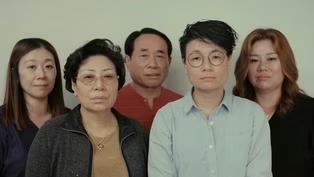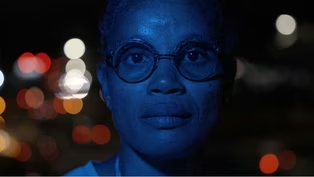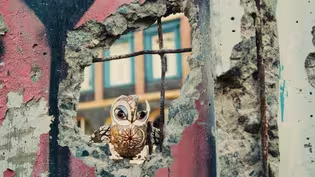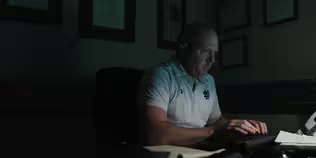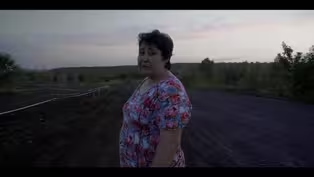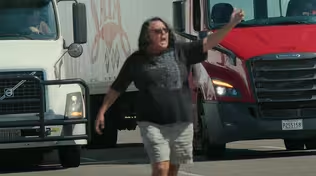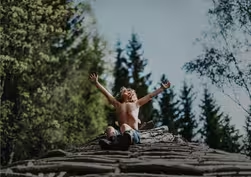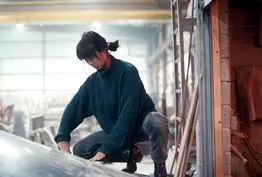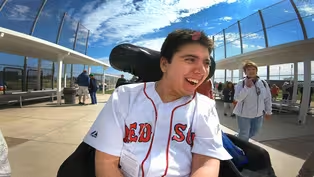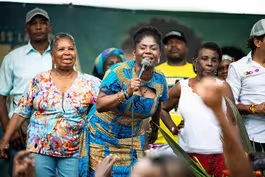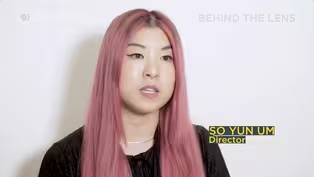
Liquor Store Dreams
Season 36 Episode 3603 | 1h 22m 16sVideo has Audio Description
Immigrant dreams and generational divides collide against LA's complex racial landscape.
In Liquor Store Dreams, two Korean American children of liquor store owners reconcile their own dreams with those of their immigrant parents. Along the way, they confront the complex legacies of LA's racial landscape, including the 1991 murder of Latasha Harlins and the 1992 uprisings sparked by the police beating of Rodney King, while engaged in current struggles for social and economic justice.
See all videos with Audio DescriptionADProblems playing video? | Closed Captioning Feedback
Problems playing video? | Closed Captioning Feedback
Major funding for POV is provided by PBS, The John D. and Catherine T. MacArthur Foundation, the Wyncote Foundation, Reva & David Logan Foundation, the Open Society Foundations and the...

Liquor Store Dreams
Season 36 Episode 3603 | 1h 22m 16sVideo has Audio Description
In Liquor Store Dreams, two Korean American children of liquor store owners reconcile their own dreams with those of their immigrant parents. Along the way, they confront the complex legacies of LA's racial landscape, including the 1991 murder of Latasha Harlins and the 1992 uprisings sparked by the police beating of Rodney King, while engaged in current struggles for social and economic justice.
See all videos with Audio DescriptionADProblems playing video? | Closed Captioning Feedback
How to Watch POV
POV is available to stream on pbs.org and the free PBS App, available on iPhone, Apple TV, Android TV, Android smartphones, Amazon Fire TV, Amazon Fire Tablet, Roku, Samsung Smart TV, and Vizio.
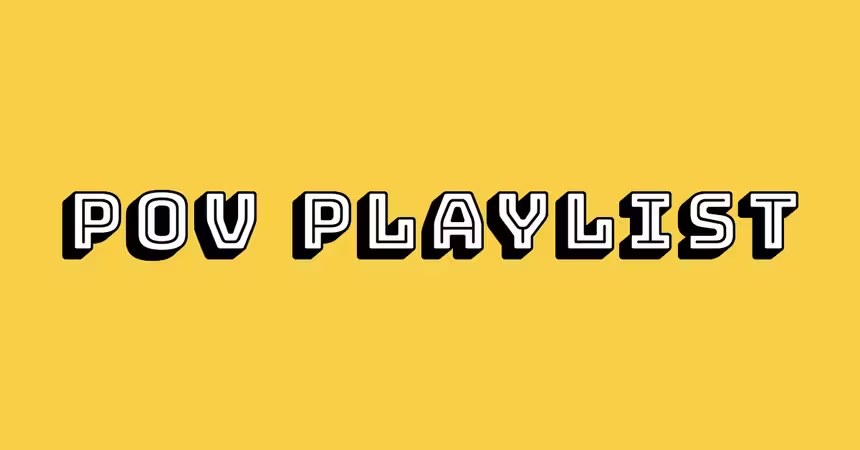
POV Playlist
Every two weeks, we curate a selection of POV docs, old and new, around a central theme. Stream while you can — until the next Playlist!Providing Support for PBS.org
Learn Moreabout PBS online sponsorshipMore from This Collection
POV Broadcast Feature Films.
Video has Closed Captions
A Korean birth mother and her daughter struggle to stay reunited for the long haul. (1h 22m 58s)
Video has Closed Captions
Poet and activist Staceyann Chin chronicles her journey of healing, forgiveness, and mothering. (1h 23m 5s)
Video has Closed Captions
Confronting war, Ukrainian artists pick up arms while finding strength through art. (1h 22m 41s)
Video has Closed Captions
A small-town attorney takes on pharmaceutical giants as opioids devastate his community. (1h 22m 48s)
Video has Closed Captions
An environmental thriller that shines new light on the human cost of coal. (1h 22m 58s)
Video has Closed Captions
In rural Mexico, a community seeks answers, uncovering alarming truths about their water. (1h 14m 47s)
Video has Closed Captions
After losing it all, Desiree Wood takes a second lease on life as a long-haul trucker. (1h 23m 3s)
Video has Closed Captions
A family’s free life in nature is disrupted by tragedy, forcing them into modern society. (52m 53s)
Video has Closed Captions
A new “innovation district” tests local democracy in a divided Brooklyn community. (1h 22m 31s)
Maya Lin: A Strong Clear Vision
Video has Audio Description
Follow the journey of Maya Lin behind the controversial Vietnam Veterans Memorial in DC. (1h 22m 54s)
Video has Audio Description
A community of disability activists help Samuel Habib, 21, navigate the path to adulthood. (1h 22m 44s)
Igualada: Refusing to Know Your Place
Video has Closed Captions
A Colombian Black rural activist's historic bid for presidency stirs a national awakening. (1h 19m 49s)
Providing Support for PBS.org
Learn Moreabout PBS online sponsorship♪♪ ♪♪ ♪♪ -Thank you.
♪♪ [ Humming ] ♪♪ ♪♪ [ Man singing in Korean ] ♪♪ ♪♪ -My dad is the hardest-working person I know.
He managed the family liquor store with great care.
15 hours a day, 365 days a year.
-[ Chuckles ] -Come closer.
You see it?
-Hm.
-Who would've guessed that a child of a liquor-store owner like me would want to make films?
That's me -- So.
I'm a liquor-store baby.
And I have big dreams.
♪♪ ♪♪ ♪♪ ♪♪ ♪♪ ♪♪ ♪♪ ♪♪ [ Chair legs squeak ] -Good!
Very good!
♪♪ -When I was 10, my parents purchased their first liquor store in Long Beach.
I have an appreciation for the family business.
It brought us financial security.
Growing up, because my parents worked so much, the television and movies were my babysitter.
♪♪ Watching Justin Lin's "Better Luck Tomorrow" showed me that I could also become a filmmaker, as I saw my angsty yet sheltered life on screen.
-...fast and furious.
-But later, discovering Spike Lee movies showed me a completely different world.
♪♪ I loved how he made politically charged films with tons of fun, flair, and sincerity.
♪♪ That was probably the first time I was exposed to a Black artist's P.O.V.
of his experience.
But even in movies, I couldn't escape my reality.
-20 "D" Energizers.
-20 "C" Energizers?
-"D." Not "C." "D." -"C" Energizers?
-"D"..."D"!
Learn to speak English first!
Alright?
"D"!
-...you!
-[ Chuckles ] -Watching "Do the Right Thing" made me realize just how common racial tensions and misunderstandings occur at so many Korean-owned shops... even across America.
-You're Korean.
-Uh-huh.
-You have any idea how much money my country has given your country?
-You go now!
-As I began to watch more films, I realized that the angry Korean liquor-store owner stereotype went beyond "Do the Right Thing."
-$6.66.
-What are you gonna do... -And it was all over mainstream media where we were portrayed as farcical and ultimately disposable sideline characters.
[ Grunting ] [ Gunshot ] -I Black!
-Me black!
-Where you Black at?
-Me Black!
-I Black!
-Me!
-You, me same!
[ Laughter ] -It was as if Spike Lee predicted the future.
-The violence began around 5:00 Pacific time in the area around this liquor store.
-This is live right now.
This is live.
-We don't see this very often.
Okay.
This is unprecedented.
We haven't seen firing like this in the streets of Los Angeles.
[ Siren wails ] -30 years after the 1992 L.A. uprising.
my family is some of the last generation of Koreans who still own liquor stores in predominantly Black and brown neighborhoods.
But even after all these years, when I step into my parents' store, it's as if we're stuck in time.
[ Ticking ] And all the shame and rage I felt growing up in my parents' store has been fueling my desire to film our lives in this place.
-...to learn more about your options and get back some extra money in your Social Security... -Hm.
♪♪ -I am surprised he acknowledged our generational gap because usually our conversation leads to more misunderstandings and fights.
And lately our main disagreement has been about my life choices.
-[ Speaking indistinctly ] Thank you.
Thank you.
♪♪ And when will my parents stop thinking that marriage is the answer to everything?
Good for her.
Forever.
-Mnh.
-So sad.
♪♪ Whenever I feel discouraged or start thinking that my dreams are hard to achieve, there's one person that inspires me to think differently and dare to dream the impossible.
Um, I just wanna see it.
Meet Danny, a fellow liquor-store baby.
[ Birds chirping ] -Growing up, I asked myself, like, if I can work anywhere, where would it be?
The one place I could think of was Nike.
♪♪ I've always wanted to do branding work for them.
♪♪ ♪♪ ♪♪ I ran from my home, Los Angeles, up to Portland, cause that's where the Nike world headquarters is.
[ Breathing heavily ] Hi.
It took me 45 days of running.
The job I wanted to do was, like, storytell.
For me, that's what, like, Nike always represented.
Just go for it and have courage.
♪♪ ♪♪ I dropped off my résumé, portfolio, cover letter and was like, you know, "Just did it."
♪♪ Getting a job at Nike, it was a big deal.
Of course, my mom was very happy.
Everybody was really proud.
Working at, like, a well-known company like that, there's, like, a sense of, like, "prestige."
-Yeah, my dad's favorite brand is Nike because of the motto.
Just Do It.
-Oh.
Just Do It.
He always says, "Just do it."
I'm like, "I'm trying" -Yeah.
-"I'm really trying."
-Now I'm asking, "Why just do it?"
[ Indistinct conversations ] [ Keypad dialing, line ringing ] -Thank you for calling Hanmi Bank.
-A couple years ago, my dad had passed away.
-[ Woman on telephone speaking indistinctly ] -While I was working at Nike, I was also flying back twice a month to help out with the store.
-Good morning.
-Good morning.
-Good morning.
-How are you?
-Alright.
-Alright, alright -After my dad passing away, my mom running the store by herself -- and knowing that that's very difficult to manage a store of this capacity, I ultimately made the decision to quit my job and do my thing here.
[ Indistinct conversations ] -You don't feel like you had to, like, forfeit your dream because of this and come back?
-I don't feel that at all.
Yeah, I'm happily here.
-Yeah.
It's such a different contrast.
I always feel like I would be burdened if my dad were to pass away and then to face a decision whether to sell it or actually take over, because didn't they sacrifice so much so I can do something better in a way?
-Yeah, for sure.
-So... -My dad would flip over in his grave if he knew that I was doing this.
He didn't even allow that conversation.
I hated my dad for a long period of my life.
My dad was a -- a very angry man.
I was at the receiving end of that.
You know, I got hit or whatever, the abuse and all that.
I was hurt.
I was really resentful and angry for a big period of my life.
You know, it was really awkward 'cause we spent many, many years not talking to each other.
So it was awkward.
But I know for -- I know for sure that deep down in both of us, we both craved it so bad.
You know?
We were hungry for it.
But we didn't quite have the communication tools.
♪♪ You know, I wish I knew more about him now, you know, and his whole life story and, um... Yeah.
♪♪ [ Laughter ] ♪♪ -Wow.
♪♪ -It's amazing to see how much they accomplished.
-[ Speaking Korean ] -How did so many Korean families in one generation follow the same path?
[ Indistinct conversations ] When did your parents buy the store?
-1993.
-Oh, wow.
Okay.
Wow.
That's a really long time.
-Yeah.
I was 9 years old when we started.
I was a little kid.
My parents were out of work for a period of time, and then an opportunity came, I guess, with this store.
-Enter your PIN.
-Thank you.
How you doing today?
-I'm fine.
How about you?
Oh.
Oh, yeah.
[ Laughs ] Empty stomach.
Alright.
-...so I had to fast.
-[ Speaking Korean ] -[ Laughs ] -♪ O say, can you see ♪ ♪ By the dawn's early light ♪ [ Indistinct conversations ] ♪♪ [ Laughter ] -Initially, I was proud of our vast network, but from the local Black and brown residents' point of view, I'm sure it was a completely different experience.
By the late '80s, Koreans owned 75% of all liquor stores in South LA.
♪♪ How did this happen?
I decided to ask UCLA professor Kyeyoung Park.
What do you think was the appeal for most Korean immigrants to come and open liquor stores?
-I don't think it was appealing to Korean immigrants.
There's a stigma attached to sell liquor.
Because most Korean immigrants and liquor-store owners, they didn't sell liquor in Korea.
There is a myth, you know, as if, like, Korean immigrants invented the liquor store and intentionally they started to sell liquor in South Central.
That isn't true at all.
They own the businesses in other neighborhood of similar economic standing.
That means middle working-class neighborhood, regardless of race and ethnicity.
That is why they went to South Central.
-The only liquor stores I knew was our own and the one stereotyped in movies.
If I never learned the history of the racial injustice in South LA before my family arrived till much later... my parents couldn't have known more than I did.
-Let's see what's up in this... And you ain't gotta be creeping.
I don't know why you tryin' to act like you cleanin' up.
[ Man speaking on radio ] Damn.
Always think we're gonna steal something.
-Hurry up and go.
-Hey, man, why don't you... -But all these shameful images of us on screen recall back to one real-life incident that my community rarely talks about.
♪♪ Most people understand that it was the Rodney King verdict acquitting four police officers that sparked the 1992 L.A. uprising.
But what some people may not remember is that only weeks after the Rodney King beating, a Korean store owner named Soon Ja Du shot and killed a 15-year-old Black teenager named Latasha Harlins over a $1.79 bottle of orange juice.
-Okay.
I know a criminal when I see one.
I know a person who presents a danger to the community when I see one.
-I believe it was an -- it was an injustice.
Justice has not been served.
This lady has killed my 15-year-old granddaughter and she get away with five years' probation?
This is an injustice.
-The judge ruled that the Korean store owner was not going to receive any jail time after killing a Black teenager.
Compounded with the acquittal of the LAPD officers, events escalated quickly, leading to many Korean-owned businesses in Koreatown burning during the 1992 L.A. uprising.
♪♪ -...to learn more about your options and get back some extra money in your Social Security... -Whenever I experience racial tension at my store, I feel like we are still connected to the controversies of the past.
Just like my community that has been so quiet about their shame and pain, my dad and I also tend to process our hurt and pain in isolation.
[ Ticking ] And there are incidents that occurred at our store that we still haven't talked about.
There is one day I'll never forget.
A random group of teenage girls came in and started opening and throwing around chips at one another.
My dad told them to stop, but they wouldn't.
♪♪ They stood in front of the stores eating the unpaid chips and taunting us.
♪♪ My dad went outside to tell them to leave, but they just laughed.
And then it happened.
They stood on each side of him and spit into his face.
♪♪ I was standing behind the bulletproof class watching this all happen in slow motion.
I felt paralyzed.
My mom wanted to chase after them and asked me to come along.
I said, "It's just chips!
Let it go" ♪♪ ♪♪ ♪♪ ♪♪ -So, I get the money from my mother and I go in the store.
I grab the Mars bar.
I put it on the counter.
And as I'm counting the change, this lady, she screams, and she's like, "Unh-unh!
Wait!
Hold on.
No, stop.
Stop.
What you doing?
What you doing?
Her mother outside.
I'm gonna go outside and I'm gonna get her mother.
-I learned watching the short film "The Dope Years" that Soon Ja Du behaved recklessly and frequently pointed guns at children.
-As I look up, I'm looking down the barrel of a gun.
-Latasha's friend even warned her not to step into that store.
-My mother comes into the store, and she's saying, "We paid for that.
The receipt is in the bag.
I asked you for the receipt.
We just stepped outside."
-But even if Soon Ja Du's action didn't represent all Korean merchants, it still created shame in me.
♪♪ Maybe my fear of the liquor store has something to do with this stereotype, that I might get stuck in this place of negativity and turn into somebody that I don't wanna be.
♪♪ Oh, yeah, we ran out today.
I think.
Miller Lite.
-Okay.
-Yeah.
Sorry.
Right?
-Where'd he go?
-You don't have to stand so close.
-Wait.
Where'd he go?
He left because there's no Miller Lite.
-Oh, my God.
You lost a...sale.
This is why you can't work here.
-No, he just wanted to come here for that.
-If you are a good salesman, you could be like, "Oh, how about a different beer?"
And, like, twist that around.
-Eh, you're not -- -There's like, "Oh, this new beer just came out.
It's basically similar as Miller Lite."
-Okay, well, most people come here for one thing, and that's, like, their thing.
-And act like you are a drinker, even though you're not a drinker.
That's how you sell.
-Then why don't you run this place?
Why?
-I wanna have my own business, not this.
-Okay.
-Yeah.
-What?
selling bows?
-Oh, sh-- Cut that out!
Cut that out!
Cut that out!
-If something were to happen to Umma and Appa, would you take over the store?
-I don't wanna do this.
That's what it comes down to.
I don't.
I mean -- -But you're so good at it.
You're a businesswoman.
-Yeah, but I'm not good at doing bitch work.
-This is not bitch work.
You are your own boss.
-Hi!
-How could you say it's bitch work when our parents do it?
-Huh?
-How could you say it's bitch work when it's Umma and Appa?
-I can't do this.
I really can't.
-Like, what about it?
-Um... -It wasn't that bad when we were doing it.
-It was.
We got robbed by a high-school kid.
Which one?
This one.
[ Indistinct conversation ] [ Laughter ] -There must have been good memories I've forgotten about, but in my experience, the bad always outweighs the good.
[ Indistinct speaking on television ] -I remember the day that she came home, she was, like, really quiet and she said something happened at the store.
-She seemed very normal.
-No, when I saw her, she wasn't.
She was, like, very, like, quiet, and she's never like that.
And then she told me what happened and...
I call Mom and Dad as often as I can, like, every day or every other day, because I'm scared that I'm gonna get a call from someone, anyone.
And I'm scared that they're gonna give me bad news.
-I realize now that the liquor-store life has taken a toll on each of my family members and my family as a whole.
But it's taken the biggest toll on my dad.
♪♪ A few days later, I saw my dad signing away paperwork to some businessmen.
♪♪ After 20 years in the business, he's finally putting the store up for sale.
♪♪ My dad is doing his best to lift the burden of the store off of all of us.
♪♪ The store has served as a meeting place for me, my family, and different minority communities we normally wouldn't encounter in our daily lives.
Without this store, would we recede back to only interacting with our Korean community?
-Hey.
Good morning.
See you.
[ Indistinct conversations ] [ Indistinct conversations ] -I recently watched the Mr. Rogers documentary, and it really -- "Mr. Rogers' Neighborhood" -- And it really -- There's a lot of parts that really impacted me, and this is something that he says, that, "A neighborhood was a place where at times that you felt worried, scared, unsafe, it would take care of you, provide understanding, safety.
That's what the neighborhood is to us.
The neighborhood is not a fantasy place where all these people got together and everything was happily ever after.
When you have different people together with diverse opinions, you have conflict, real conflict."
-Alright.
Yeah.
[ Laughs ] I've been here since 2009.
Doesn't seem too long.
You know, days fly by really fast.
Well, you know, you make mistakes down in your life, and you end up in these places to help you build yourself back up.
-Ooh!
-Next time.
We're gonna charge you next time.
-Today's 75.
75 today.
-The American dream is like to have a good job, a house, a good wife, four kids, two cars, and a everlasting pension.
But to me, just to live.
That's it.
-Ah.
-[ Laughs ] -Bye.
God watch you.
-Yeah.
When I first started working here, I didn't really have any problem.
You know, people told me, "Oh, don't do it.
Don't do it.
It's not good.
They're gonna overwork you.
They don't really care about you.
You know, they're just using you to protect themselves."
They weren't any type of racist towards me.
Like, they speak in their language, you know?
I don't take that as a bad thing, you know, 'cause that's their tongue.
That's how they talk to each other.
They speak to me in English.
Before I started working, I really didn't like anybody.
You know, everybody was the enemy.
They taught me that not everybody's an enemy.
$3.49.
I'm happy right now.
Like, you know, even though I'm still considered homeless, I'm still happy within me.
-Do you have the black one?
-Can I get a mixed fruit.
-...and they really encouraged you... -Outside of Skid Row, there's a lot of anger and a lot of frustration.
There's so many deaths, so many, like, suicides.
What do we do about all that?
The last time you visited, it was Best Market, and this year we had a transition into Skid Row People's Market.
♪♪ A lot of the work that we're trying to do is, how do we get better food at a more affordable price?
We have a red potato salad and a tuna salad, all fresh, packaged here.
And it's also a way that we could create jobs and teach culinary skills to people in the community... using this space for folks to come together, to have conversations, to talk, meet one another.
♪♪ -Initially I got involved with going around to the local little grocers to find out actually who was selling really kind of healthy foods.
And to my amazement, I found that, you know, the store here actually had the most healthiest of foods.
Food preparation and cooking was part of my journey before I ended up homeless.
And the last two years that I've had my own kitchen, it's been part of my recovery in also of creating a healthy lifestyle, so I just wanna thank you... -Thank you.
[ Applause ] -Yesterday, in our staff meeting, one of the things that we were talking about was, what is safety?
What does safety look like?
And in our dialogue, we begin to talk about a smile.
It was said, "A smile is powerful.
A smile can be disarming.
A smile is transformative."
My mom, Mama, has a smile that has kept this market warm for 22 years.
-Yes, yes, yes, yes!
[ Cheers and applause ] -Yes!
♪♪ ♪♪ ♪♪ -The neighborhood that we're in, in Skid Row and always hearing, like, the term "homelessness" and "houselessness"... And that's a part of what we're looking for, right?
Our identity.
Korean American.
Children of liquor-store owners, immigrant store owners.
The sense of belonging 'cause we don't quite feel home in Korea and we don't quite feel home here in America.
♪♪ A house is a physical structure, but, like, a home is a non-tangible, and so I feel like we're all constantly searching for that, a sense of belonging where you feel accepted for just who you are.
♪♪ [ Cheers and applause ] -As a second-generation Korean American, I've always dreamt of a future where communities aren't pitted against each other, but building together.
[ Applause ] If anyone can do it, it's Danny.
[ Indistinct conversations ] -Chaos and destruction in Minneapolis tonight as police officers and protestors clash over a man's death.
-In the video, you can see an officer kneeling on Floyd's neck, pinning him to the ground outside Cup Foods on Chicago and East 38th Street.
-We were already living in a global pandemic when my dad saw George Floyd murdered on the news.
-And many protestors... -...rapid developments from Minneapolis to Los Angeles.
As the nation remains on edge, protests over the death... -There is a curfew -- 6:00 p.m. to 6:00 a.m. And simply put, th at means you have to stay in.
[ Siren wails ] ♪♪ -He and other liquor-store owners worried that their business would get targeted like they did back in '92.
[ Helicopter blades whirring ] As Korean Americans, we are reminded of a moment in history that we'll never forget -- the '92 L.A. uprising, commonly known as the L.A.
Riots, or, to Koreans, Saigu.
I was only 3 years old, so I have to remind myself that during this time more than half of the citywide damages were Korean-owned.
♪♪ -We are on Olympic Boulevard in Koreatown at the Olympic Discount Store.
There are 28 men, armed men, everyone with guns, protecting this store.
They have done such a job here.
-This is live right now.
This is live.
-We don't see this very often.
Okay.
This is unprecedented.
♪♪ ♪♪ [ Helicopter blades whirring ] -[ Speaking Korean ] -...huge peaceful protests by day demanded justice for George Floyd.
-Say his name!
-George Floyd!
-To those who want to turn this into something that it's not, please stop.
-Then, mostly under the cover of darkness, violence erupted, chaos lasting well into the night.
The New York... -...and projectiles into crowds... -Mnh-mnh.
-I know, but... -Nobody know.
Nobody know.
-[ Speaking Korean ] -[ Sighs ] -[ Speaking Korean ] [ Ticking ] -Couldn't he try to put himself in someone else's shoes for one second?
[ Tick ] [ Indistinct conversations ] -Okay.
Where do I put this?
-[ Speaking indistinctly ] [ Indistinct shouting ] -Many came out and filled the streets still trying to grapple how to promote peace between the Korean and Black community.
-We want justice.
We want peace.
We want justice.
We want peace.
-And although there were many efforts to bridge our two communities together, I wonder how equipped they were to make any lasting changes amidst the trauma of losing everything.
♪♪ Although there is a lot of fear in my community of losing their businesses again, the tides are shifting, and many of us now understand that it's only through solidarity that can bring real change.
[ Helicopter blades whirring ] -Black lives matter!
Black lives matter!
Black lives matter!
Black lives matter!
Black lives matter!
Black lives matter!
Black lives matter!
Black lives matter!
Black lives matter!
Black lives matter!
[ Indistinct conversations ] ♪♪ ♪♪ -30 years after the Koreatown peace rally, here we are.
♪♪ -I chose to assimilate with white people for my own self-preservation.
I didn't speak up against racism because I was scared.
-Anti-Blackness within our community is severe!
Within the communities of color is severe.
In Asian community is severe.
Step by step.
We don't have time.
But we have to educate ourselves.
♪♪ [ Cheers and applause ] ♪♪ [ Cheers and applause ] [ Woman speaking indistinctly ] -Do you feel like you were a little bit scared to get a store because you knew that that happened?
-Southern California has been hit hard since the pandemic began.
Our I-team found counties here have four times the death rate compared to San Francisco.
And those who lost loved ones are now questioning what could have been done differently to save them.
-Since COVID, it's been slower.
We applied, but we didn't get any loans.
We paid all our employees.
We had a fundraiser for that.
-Working on Skid Row is kind of difficult, you know, when you're also dealing with your own issues, as well.
-So why are you leaving?
-Uh... -So, I've -- I've gone through struggles.
Throughout working, throughout the year just become draining, it's become stressful, and it's become bad for my health.
-When you told Danny, what did he say?
-What?
About?
-You're like, "Oh, I wanna leave."
-Well, he just wished me good luck.
I mean, he's a great dude, man.
I -- He still encourages me to do my best.
[ Indistinct conversations ] -Two of our workers, they're over 70.
I asked them if they could stay home for the time being.
Instead of hiring another employee to fill that spot, I took that spot.
I was working more hours.
Angie, my sister, started working here and helping out.
You know, we feel, like, more tension in the air, too.
The fights and the violence.
[ Indistinct shouting ] Huh?
Yeah.
Yeah.
He's good.
-Thank you.
-It was okay.
I didn't.
-Okay.
-You alright?
-I know, I know.
Take a deep breath.
Walk away.
Take a deep breath.
-I've felt this often, as soon as I woke up in the morning at 4:00, eyes open, and it's, like, these suicidal thoughts... not wanting to go to work because when I go, it's so difficult.
You wanting to crawl up into a ball or run away as far as -- just leave.
You just can't see anything outside of that.
And so...
I guess you -- you plan your exit.
[ Siren wails ] After being open for a year in the pandemic, I decided we needed a break, so we temporarily closed the store.
♪♪ -Despite many businesses closing for good during the 2020 global pandemic... -Thank you.
-...our liquor store did surprisingly well.
-But not only that, now we have potential buyer's interest in our store.
♪♪ If the store sells, I hope my dad can finally get the rest that he deserves... -[ Humming ] -...and find new dreams beyond survival.
-[ Humming ] -Also, it would be nice to spend time together that's not at the store for once.
-[ Humming ] -[ Speaking Korean ] -Growing up as a man in the society and thinking that so much of the responsibility lies on my shoulders and mine only... to take care of your family, take care of your people, take care of your community to survive, to make that money.
I was trying to cope and look for relief by drinking a lot.
And I saw the same behaviors that I saw in my father and other men I know, other men in my family.
I relate to my father.
I did feel similarly, having the weight all on my shoulders.
You know, at the end of his life, the thing that I felt most proud of was getting that relationship back with my dad.
We were like best friends.
We were, like, holding each other, hugging each other, saying, "I love you," to each other, which is very uncommon for Koreans.
♪♪ You know, on a more individual, like, level, like, that's what I think about, you know?
Like, there's a reactionary suicide and there's the revolutionary suicide.
♪♪ "But before we die, how shall we live?
I say with hope and dignity.
And if premature death is the result, that death has a meaning reactionary suicide can never have.
It is the price of self-respect."
Earlier this year, I visited my grandfather's grave for the first time.
I didn't even know it was at Rose Hills.
Went there with my mom.
I asked her if we can go.
And, yeah, we went together.
♪♪ As soon as we got there, my mom's like... [ Speaking Korean ] I just didn't expect that.
Just experiencing that... Mommy and Daddy together.
-We always forget that our parents are also, like, sons and daughters.
-Oh.
Yeah.
Wow.
♪♪ -I've known, you know, for some time, but I never really, like, thought too deeply about it until last year.
Even if I've never met my grandfather in person, he's very much alive in my behaviors.
Those are all manifestations, I think, of my grandfather's agony.
♪♪ I'd tell my grandfather and my father that... you know, it's like, it wasn't like all your fault, you know?
So, uh, rest and be free.
Part of our healing may involve the healing of our parents.
♪♪ Actually, there is no individual.
Healing changes.
It's all relational.
♪♪ [ So and Hae speaking Korean ] -...a Black teenage girl named Latasha Harlins over a $1.79 bottle of orange juice.
-Anti-Blackness within our community is severe!
Within the communities of color is severe.
Step by step.
We don't have time.
But we have to educate ourselves.
-[ Laughs ] [ Laughs ] [ Clears throat ] ♪♪ ♪♪ -The time and years of working there for us all, you know, it's traumatic, and so going back into it, we go in knowing that it's not easy work.
♪♪ [ Laughter ] -Mark!
So you came back?
-Yes, fortunately I did come back.
-How'd you make the decision?
-Well, I went through a spiritual retreat to, say, get rid of all the evil demons and to start afresh.
So Danny was cool enough to let me go through that adventure and then come back and then continue on.
-How do you feel?
-I'd say I feel a lot better.
You know, from 2018, it was a little rocky for the start, you know?
You gather up a lot of bad energy here, you know, and then you take your break and then you release that energy and then start over.
So -- [ Laughs ] -To me, I think it is a spiritual thing that we are all here together.
I think the creation has made us from the time -- Before we can even think about each other, I think the creation has put us here for a purpose far beyond what any one of us can assume or think.
So I give thanks for everyone that's here.
That's it.
[ Applause ] -Latasha Harlins.
-Latasha Harlins.
-Breonna Taylor.
-Breonna Taylor.
-George Floyd.
-George Floyd.
-Ahmaud Arbrey.
-Ahmaud Arbrey.
-This holiday, Chuseok, is traditionally from farmers in Korea.
It's the big harvest festival of the year, and so we get together and we pause and we eat and celebrate and also have time to connect back with our ancestors.
♪♪ -The same system that caused the conflict between Latasha Harlins and Korean communities and Black communities.
When Koreans are trying to make a living and Black folks are trying to make a living, the same system affected us totally different, but at the same time, it's the same system.
♪♪ ♪♪ See, that is the value of life.
The value of life is when we begin to help each other.
What we need in our society is not more enforcement, but more inspiration.
♪♪ ♪♪ ♪♪ -I find myself looking back to our ancestors and seeing, what are they calling us to do?
We're a generation out of the long generation of humanity.
♪♪ And one day we will be up on -- we will be on the ancestor side, too.
♪♪ ♪♪ [ Indistinct conversations ] -It's hard to believe that this day is finally here.
Creating this film gave us the space to have difficult conversations, and I'm so thankful it brought us closer together rather than tearing us apart.
I want to honor my parents' struggles by transforming the past and creating my own future... but, most importantly, keep dreaming.
-[ Singing in Korean ] ♪♪ ♪♪ ♪♪ ♪♪ ♪♪ ♪♪ ♪♪ ♪♪ ♪♪ ♪♪ ♪♪ ♪♪ -[ Singing in Korean ] ♪♪ [ Laughter ] -[ Speaking Korean ] ♪♪ -♪ So go and let my feelings fall ♪ ♪ So apologies are made for fun ♪ ♪ So I can fall ♪ ♪ And hurt and learn ♪ ♪ But you don't need to change ♪ ♪ And that's how it is ♪ [ Indistinct conversation ] ♪♪ ♪♪ ♪♪ ♪♪ ♪♪
Behind the Lens: Liquor Store Dreams
Video has Closed Captions
Clip: S36 Ep3603 | 1m 27s | A message from the filmmaker. (1m 27s)
Providing Support for PBS.org
Learn Moreabout PBS online sponsorshipSupport for PBS provided by:
Major funding for POV is provided by PBS, The John D. and Catherine T. MacArthur Foundation, the Wyncote Foundation, Reva & David Logan Foundation, the Open Society Foundations and the...
